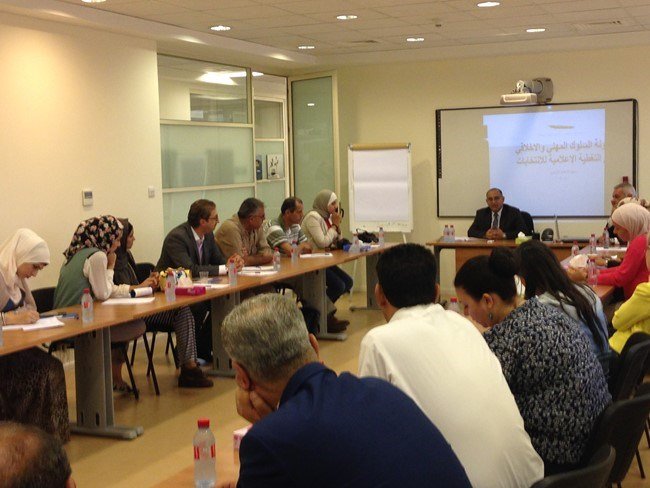Image:

15 Aug 2016
The Jordan Media Institute (JMI) today, Monday, organized a discussion, which was attended by journalists from local newspapers and the Jordan News Agency with the aim of issuing a voluntary, professional, and ethical code of conduct for media coverage of the parliamentary elections 2016. This is in collaboration with the project for supporting civil society organizations. <br />
<br />
Dr. Basim Tweissi, dean of JMI, opened the discussion by speaking about the importance of the code of conduct as terms of reference for journalists to benefit them in providing fair and balanced coverage of Jordanian parliamentary elections. He pointed out that having a document to enlighten media persons makes media coverage easier, clearer, and more transparent. The code of conduct also ensures independence, accuracy, fairness, and lack of conflict of interest. <br />
<br />
Dr. Tweissi pointed out that this code, which the Jordanian journalistic and media body will hopefully agree on, comes as an introduction to the project of monitoring the coverage of Jordanian media of the next parliamentary elections and issuing three reports on the performance of media outlets for this year. The first report will monitor media coverage in the registration stage. The second report will monitor the stage of election campaigns. The third report will monitor the stage of announcing the results and its implications. <br />
<br />
Dr. Sakhr Khasawneh presented to journalists the code and a set of rules that regulate media coverage of the elections. These rules are inspired by international principles and the experiences of countries that are advanced in this domain, with modifications to fit Jordan's legislative, media and local environment.<br />
<br />
Dr. Khasawneh emphasized that the code of conduct, which JMI is seeking to help the media community to adopt in order to improve the quality of media content and the performance of media outlets, is self-regulation to be agreed on by journalists. This makes commitment to it personal and voluntary. It will not be used as a legal instrument against journalists; it will be used for the purposes of achieving fair and neutral media coverage. <br />
<br />
The first session was devoted to coverage of the printed press of parliamentary elections. It will be followed by another session for audiovisual media and a third for electronic news sites. The code will be launched in its final form next week. <br />



